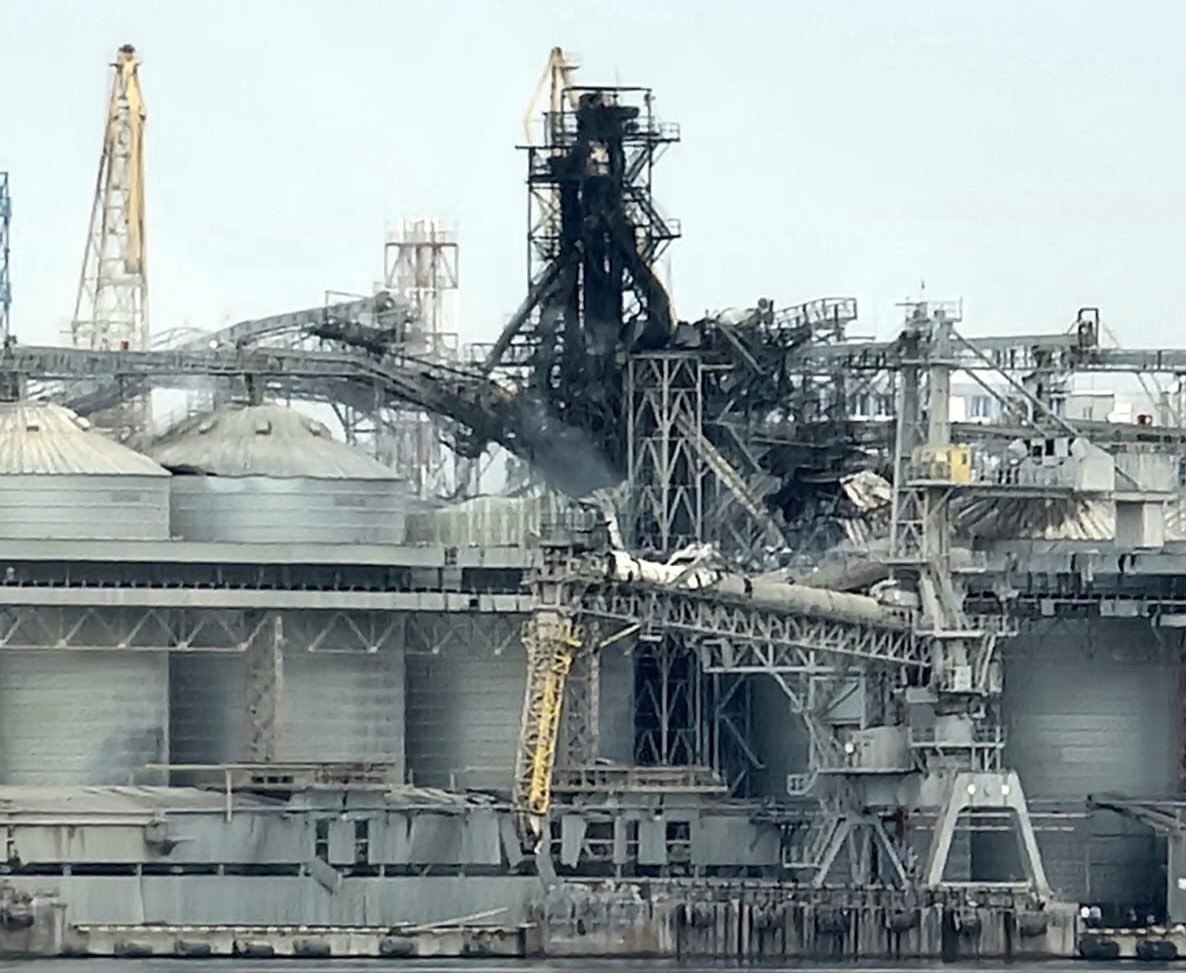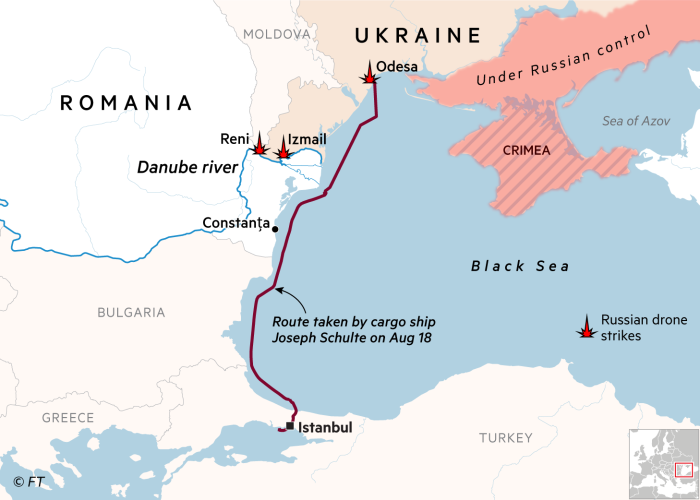Ukraine’s crucial Danube ports battle rising costs

Zachar Medvedev shrugged when the air raid warning sounded, despite the Russian drone attack that had hit Ukraine’s river port of Izmail only 12 hours earlier.
“As the saying goes, if you are scared of wolves, don’t go into the forest,” said the 33-year-old, who manages the grain export facility built on the Danube by Nibulon, one of Ukraine’s biggest agro-industrial companies.
For the past two months, Russia has launched waves of drone attacks on Ukraine’s Danube ports. Their aim has been to cripple Ukraine’s economic infrastructure and the export routes set up to break Moscow’s naval blockade of the Black Sea, Kyiv and its western allies say. Ukraine, which produces half the world’s sunflower oil exports and 10 per cent of its wheat, has exported about 35mn tonnes of grain via the Danube over the past 12 months. Alongside rail freight through Europe, this has provided vital economic support for the country’s war effort against the Russian invaders.
But how long Ukrainian companies can absorb the extra cost of these alternative routes has become a pressing issue — especially after Russian president Vladimir Putin on July 17 suspended a UN-brokered deal that had allowed the safe export of 33mn tonnes of Ukrainian grain via the Black Sea.
Russian drone and missile strikes in Ukraine have also destroyed 280,000 tonnes of stored grain since July, according to the UK government. “Increasingly it makes no sense for Ukrainian farmers to plant crops as they just lose money,” said Yevgen Osypov, chief executive of Kernel, one of Ukraine’s largest agro-industrial companies. High costs would undercut Ukrainian grain production and lead to exports halving in 2024 from last year’s levels to about 35mn tonnes, he predicted. International wheat prices fell 3.8 per cent in August compared with July, according to the UN’s FAO Food Price index, meaning prices are now well below the levels they surged to last year following Russia’s full-scale invasion of Ukraine.
But Osypov feared when the market realises the size of the coming shortfall next year, global food prices would soar once again. He called it “a big game for Russia” with tragic consequences for world hunger.
The rerouting of Ukrainian exports via the Danube has been a logistical task of Herculean proportions. So many trucks carry grain to Izmail and the nearby Danube port of Reni that queues can back up 35km. To preserve road surfaces during the summer, they can only travel at night or when day temperatures are less than 28C. The grain is then loaded into barges, sailed via inland waterways to Romania’s Black Sea port of Constanta, where the cargo is loaded on to larger seaborne tankers. There are also significant costs involved.
Viktor Berestenko, president of Ukraine’s association of international freight forwarders, estimates that to export a tonne of grain to Egypt via the Danube costs about $116 per tonne compared with about $69 before Russia’s invasion last year. Even when the Russian grain accord was in place, a go-slow by Russian inspectors mandated to check Ukrainian cargos at sea meant transport costs were not much lower.
Andrey Sokolov, a partner in Tully Logistics, estimates the expense of a two-month delay by Russian inspectors is broadly equivalent to the cost of Danube routes. On average, he said delays were between one and two months. “My opinion is that Russia only did the grain deal because it controlled it,” Sokolov said.

As a first step to reopen Black Sea shipping routes, Ukraine has launched aerial drone strikes on Russian naval bases in Crimea. It has also threatened Russian commercial shipping, with marine drone hits on a Russian tanker and a warship at the Novorossiysk naval base.
“Russia’s navy is now struggling to operate in the Black Sea,” commented a senior western official on the Ukrainian attacks. The Black Sea is “becoming a more competitive space, alongside the fight on land”.
Kyiv has also opened what it calls a “humanitarian corridor” through the Black Sea. A handful of cargo ships including the Joseph Schulte have sailed out of Odesa seaports, hugging the Ukrainian coastline until they reach the safe waters of Nato members Romania and Bulgaria. But no vessel has risked an inbound journey.
“It would be good if empty boats also came to pick up cargos,” said Oleksandr Myronenko, chief operating officer of Metinvest, Ukraine’s largest steel producer, which has sailed three boats out through the corridor.
Back at Izmail, the air raid siren stopped and loading operations restarted. Despite a previous drone strike that had destroyed a warehouse, there was little sign that the infrastructure at Nibulon’s facility, spread out over a large area, had been seriously degraded.
Multiple boats were also loading at other piers. Despite the security risks from almost daily Russian drone strikes, shipping data showed as many as 89 boats were in port at Izmail and another 27 upstream at Reni on Saturday.
“The benefit of the Danube is that there are multiple places where you can load and the infrastructure is spread out,” said Andriy Vadatursky, Nibulon’s chief executive and scion of the family that owns the company. “It also means that Ukraine does not dance to Russia’s tune.”
Ukrainian farmers and shippers say Danube’s capacity can expand further. Even so, its high costs mean the Black Sea needs to reopen for the health of the Ukrainian economy — with or without Russian co-operation.
“The Black Sea corridor isn’t just about grain corridor. It needs to be an everything-export corridor. All of Ukraine’s economy routes through the Black Sea,” said Andrey Stavnitser, co-owner and chief executive of TIS, a terminal operator at the Black Sea port of Pivdenny.
A scheme that Kyiv is finalising with global insurers may help that happen. The aim is to provide insurance for up to 30 ships travelling into Ukraine via its corridor every month, with losses of up to $30mn covered by state funds in effect held in an escrow account. “What is eventually going to happen is probably that the Russians will continue to attack our port infrastructure and we will counter-attack with marine drones,” Stavnitser said. “It’s going to be a full-blown pirate operation by both sides.”
Read also
Wheat in Southern Brazil Impacted by Dry Weather and Frosts
Oilseed Industry. Leaders and Strategies in the Times of a Great Change
Black Sea & Danube Region: Oilseed and Vegoil Markets Within Ongoing Transfor...
Serbia. The drought will cause extremely high losses for farmers this year
2023/24 Safrinha Corn in Brazil 91% Harvested
Write to us
Our manager will contact you soon



